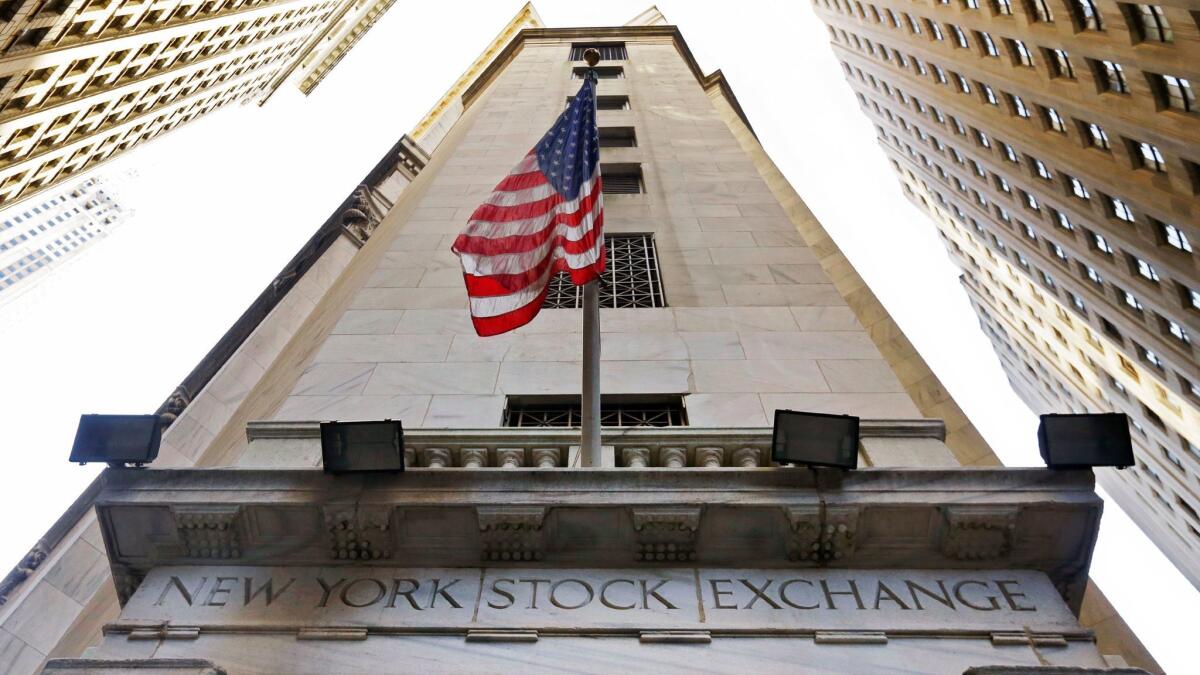Stocks have a second day of modest losses; Macy’s drops 8%

Retailers led a modest slide in U.S. stocks Tuesday as the market eased back for the second day in a row, pulling it further below record highs set late last week.
Macy’s sank more than 8% after warning that its profit margins could be weaker than it previously forecast. Several other retailers, including Conn’s and Casey’s General Stores, also slumped after issuing disappointing quarterly results or outlooks.
Banks and other financial companies also posted losses as the yield on the 10-year Treasury slipped to 2.14%, the lowest level since November. Lower bond yields mean lower interest rates on loans, which hurt banks’ profits.
Energy stocks notched the biggest gain as crude oil prices rebounded.
“This is a market that’s taking a breather and is prepared to move. The question is: in which direction?” said Quincy Krosby, a market strategist at Prudential Financial. “Perhaps the move is going to be, in the short term, a pullback, and perhaps that’s another reason we have money going into the Treasury markets as a hedge.”
The Standard & Poor’s 500 index fell 6.77 points, or 0.3%, to 2,429.33. The Dow Jones industrial average slipped 47.81 points, or 0.2%, to 21,136.23. The Nasdaq composite index fell 20.63 points, or 0.3%, to 6,275.06.
Small-company stocks fared better than the rest of the market. The Russell 2000 edged down 1.55 points, or 0.1%, to 1,394.90.
Despite the two-day market slide, the major indexes remain near their most recent record highs set Friday.
For the second day in a row, trading got off to a subdued start Tuesday as investors sized up the latest batch of company earnings and economic news.
The Labor Department provided some encouragement early on, reporting that job openings rose 4.5% in April to more than 6 million — the most since December 2000, when the government began tracking the data. Still, hiring fell 4.8%.
On Friday, the government reported that employers added just 138,000 jobs last month, about one-third below last year’s average monthly gain.
Investors found little encouragement in the latest crop of outlooks from several big retailers Tuesday.
In a presentation to investors, Macy’s Chief Financial Officer Karen Hoguet said the company’s gross margins could fall more than Macy’s expected a couple of months ago, with the first half of the year especially weak. The company continues to grapple with too much holiday inventory and a lot of discounts on beauty products.
Macy’s was the biggest decliner in the S&P 500, diving 8.2% to $21.90.
Other department store chains also fell. Kohl’s sank 5.8% to $35.73. Nordstrom slid 3.6% to $40.14.
Conn’s sank 9.1% to $17.15 after the furniture and mattress retailer issued a disappointing second-quarter outlook for sales at its established stores.
Casey’s General Stores slid 8.4% to $106.66 after the convenience store operator’s latest quarterly report card fell short of analysts’ expectations.
Not all retailers had a bad day. G-III Apparel Group climbed 15.2% to $22.92 after the owner of Wilsons Leather and G.H. Bass stores posted better-than-expected quarterly results. The company also raised its estimates for the year.
Pandora Media sank 7.7% to $8.75, more than giving back the gains it racked up Monday on rumors that Verizon Communications would invest in the streaming music company.
HD Supply Holdings dived 17.5% to $34.03 after the industrial supply company reported weak earnings and said it will sell its waterworks business for $2.5 billion.
Thor Industries climbed 10.1% to $104.26 after the RV maker posted profit and sales that were much better than expected.
Albany Molecular Research climbed 8.9% to $21.53 after the drug development company agreed to be bought by the Carlyle Group and GTCR for $21.75 a share, or $934 million.
A weak report on retail sales in the 19-country Eurozone weighed on European stock indexes. Germany’s DAX was down 1%, and France’s CAC 40 fell 0.7%. Britain’s FTSE 100 was flat as Thursday’s election there approaches. In Asia, Japan’s benchmark Nikkei 225 sank nearly 1%, while Hong Kong’s Hang Seng edged up 0.5%. South Korean markets were closed for a holiday.
In energy futures trading, crude oil prices rebounded after an early slide. Benchmark U.S. crude climbed 79 cents, or 1.7%, to $48.19 a barrel. Brent crude, used to price international oils, rose 65 cents, or 1.3%, to $50.12 a barrel.
Wholesale gasoline rose 2 cents, or 1.1%, to $1.55 a gallon. Heating oil rose a penny to $1.47 a gallon. Natural gas rose 6 cents, or 2%, to $3.04 per 1,000 cubic feet.
Among metals, gold added $14.80, or 1.2%, to $1,297.50 per ounce. Silver rose 13 cents to $17.71 per ounce, while copper lost a penny to $2.55 per pound.
In currency trading, the dollar weakened to 109.54 yen from 110.49 yen. The euro rose to $1.1271 from $1.1255.
ALSO
Cornerstone OnDemand reimagines the corporate training video experience
Column: California bill would end ‘purely profit-driven’ practice of drug-company coupons
UPDATES:
3:25 p.m.: This article was updated with closing prices, context and analyst comment.
8:45 a.m.: This article was updated with market prices, context and analyst comment.
This article was originally published at 7 a.m.
More to Read
Inside the business of entertainment
The Wide Shot brings you news, analysis and insights on everything from streaming wars to production — and what it all means for the future.
You may occasionally receive promotional content from the Los Angeles Times.










